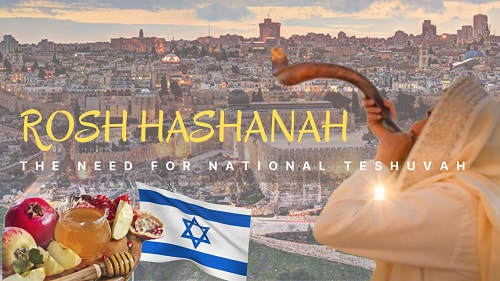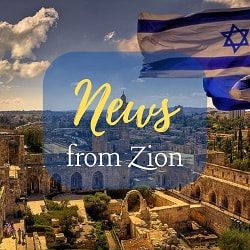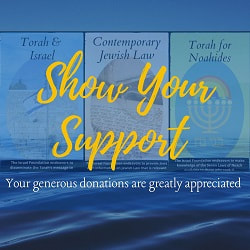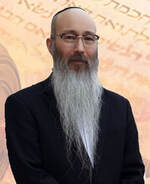|
By: HaRav Menashe Sasson Reporting from Jerusalem, Israel Published in the U.S.A. I. The Nature of Teshuvah Rosh HaShanah [ראש השנה], literally translated, means “head of the year.” It is, in other words, the holiday which celebrates the Jewish new year. However, unlike other new year celebrations, Rosh HaShanah is not observed with raucous parties and fireworks. Rather, it is a somber day of reflection and prayer. Tanakh refers to the holiday not as Rosh HaShanah, but rather, as Yom Teruah [יום תרועה], which, literally translated, means “day of ‘blast’ (of shofar), ‘trumpet call,’ ‘cry,’ or ‘alarm.’” “[T]here shall be a day of rest for you, a remembrance with shofar blasts [תרועה], a holy convocation.” Vayyiqra 23:23. Rosh HaShanah is the first of the two Jewish “High Holidays,” the Yamim Nora’im [ימים נוראים], the “Days of Awe.” The second of the two High Holidays is Yom Kippur [יום כיפור], the Day of Atonement. The ten days between Rosh HaShanah [ראש השנה] and Yom Kippur [יום כיפור] are known as the Aseret Yemei Teshuvah [עשרת ימי תשובה], the Ten Days of Repentance. The misva of Rosh HaShanah [ראש השנה] is to hear the blowing of the shofar, Vayyiqra 23:23, which is intended to motivate individuals to do teshuvah [תשובה], that is, to repent for one’s sins, during the Aseret Yemei Teshuvah [עשרת ימי תשובה]. Teshuvah atones for all sins. Mishneh Torah, Hilchot Teshuvah 1:3. Teshuvah, in turn, consists of four elements: (1) ceasing the commission of the particular sin; (2) removing the particular sin from one’s thoughts; (3) resolving in one’s heart to never again commit the particular sin; and (4) verbally confessing commission of the sin. Id., 2:2. “The confession should be made ‘before G-d,’ and not in public.” Id. 2:1, n.9. II. The Misva to Conquer Eretz Yisra’el HaShem commanded the Jewish people to expel the gentile inhabitants of the Land (Eretz Yisra’el) and to not enter into an agreement with those inhabitants that would allow them to remain in the land.
Shemot 34:11-17. The Halakha – Jewish statutory law – relating to gentiles living in Eretz Yisra’el recognizes two classes of people: those who claim an ownership or similar interest in Eretz Yisra’el and those who do not claim any such interest. Regarding those who claim an ownership interest in the Land, the Torah is not referring merely to ancient civilizations who just happened to be occupying Eretz Yisra’el at the time the Jewish people crossed the Yardan (Jordan river) to enter and conquer Eretz Yisra’el; rather, the Torah is referring to any people – for all time – who claim a legal right to Eretz Yisra’el which is superior to that of the Jewish people. According to the Or HaHayyim, the pesuk which states that: “You are to drive out all of the inhabitants of the land. . . .” means that:
Abarbanel, Commentary on Shemot 34:11-12. III. The Misva to Reside in Eretz Yisra’el The Talmud states:
Maseket Ketuvot, 110b. Halakha, that is, Jewish statutory Law, states that the misva of living in Eretz Israel is timeless; it is still the Halakha today. The Shulchan Arukh, Even HaEzer 75:4, states that: “If [a husband] proposes to ascend to Eretz Yisrael and [the wife] does not want to [go], [the husband] must divorce her. . . . [And if the wife] proposes ascending [to Eretz Yisrael] and [the husband] does not want to [go], he must divorce her.” IV. The “Palestinians” The Roman emperor Hadrian conquered Judea in the year 135 C.E. The Jewish warrior Bar Kokhba was killed and the Judeans (the Jewish residents of Judea) were exiled to the four corners of the earth. Hadrian enacted laws, punishable by death, which made it illegal for any Jew who remained in Judea to keep Shabbat, study Torah, or circumcise their children. Yerushalayim was bulldozed and renamed “Aelia Capitolina.” Hadrian also changed the name of “Judea” to “Palestine.” Notwithstanding that Hadrian changed the name of Judea to “Palestine,” there has never been a Palestinian people separate and apart from the Jewish people, nor has there ever been a State of Palestine. The modern-day Arabs who call themselves “Palestinians” are nothing more than a people who lost any contemporary legal right to Eretz Yisra’el that they might arguably have had – including Judea and Samaria – during the wars of 1948 and 1967. V. The Jewish Sins Which Require National Teshuvah The first sin which requires teshuvah is the failure of the Jewish people, through their elected government officials in Medinat Yisra’el (the State of Israel), to have immediately asserted sovereignty over the entirety of Medinat Yisra’el following the conclusion of the 1967 war. When a person reacquires a lost object, his natural inclination is to immediately claim ownership of the object. If he does not immediately do so, he “opens the door” to competing claims. So too, it is with Medinat Yisra’el and the liberated territories of Judea and Samaria. The reason Medinat Yisra’el did not – and has not yet – asserted sovereignty over the liberated territories has to do with separate, but interrelated issues of demographics and an erroneous application of certain provisions of Medinat Yisra’el’s founding documents. Regarding demographics, Medinat Yisra’el is concerned, as it has continually been concerned since its founding in 1948, that Israeli-Arabs will someday become a majority, rather than a minority. Were that demographic shift to occur, Medinat Yisra’el, through its democratic elections, would cease to be the nominally Jewish state that it is today. Medinat Yisra’el’s founding documents provide that Medinat Yisra’el is both a Jewish state and a democracy. Since its founding in 1948, Medinat Yisra’el has assumed that Israeli-Arabs must be granted the same political rights (e.g., the right to participate in the political process through voting and the ability to hold public office) as Jewish-Israeli citizens. This irrational, indeed schizophrenic, assumption has led to the present situation wherein the Jewish government is literally afraid to do what is in the best interest of the Jewish state and the Jewish people, for fear of antagonizing its Arab residents. The only way Medinat Yisra’el can hope to be both a Jewish state and a democracy is for citizenship, and the democratic rights of citizenship, to be reserved solely for its Jewish citizens, to the exclusion of all others. To some, this idea might sound outrageous. The question that should be posed to these individuals is, simply: Which Arab state(s) allows Jews to vote? There is no historical precedent of two peoples, both of whom claim a legal right to a particular geographic area, to live together peaceably on that land for any prolonged period of time. Medinat Yisra’el is no different. The second sin which requires teshuvah is the failure of the Jewish people, through their elected government officials in Medinat Yisra’el, to adopt a legal system based on the Torah and to encourage non-Jews who claim a right to the lands of Medinat Yisra’el, through financial and political incentives, to emigrate from Medinat Yisra’el to other countries. May we, the Jewish people, do teshuvah for our national sins; receive atonement for those national sins; and thereby be written and sealed in the Book of Life. שנה טובה ומתוקה Shana Tova u’Metuka! Copyright © The Israel Foundation. All Rights Reserved.
0 Comments
Your comment will be posted after it is approved.
Leave a Reply. |
THE ISRAEL FOUNDATION





